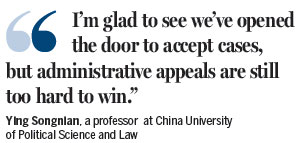Governments should 'respond promptly' to lawsuits
Government departments should respond promptly when they are involved in administrative lawsuits, according to a statement released on Tuesday after the 17th Meeting of the Central Leading Group for Deepening Overall Reform.
Administrative litigation is an important legal avenue for resolving administrative disputes and protecting the rights and interests of citizens and organizations, the statement said. Responding to lawsuits, rather than manipulating trials, is a statutory duty of government, it added.
The statement, which was issued by a group tasked with steering reform, said that government departments should support the courts in accepting and handling cases. Administrative bodies should reply to charges and make their appearance in court according to the law, it said.
Ying Songnian, a professor specializing in administrative law at China University of Political Science and Law, said better case hearings, especially for administrative disputes, would improve judicial credibility.
Ying spoke highly of a guideline issued by the Supreme People's Court in May aimed at removing unnecessary barriers for litigants to appeal, saying that the easier access to filing a case is helpful in reducing conflicts.
Under the guideline, the number of appeals that Chinese courts received skyrocketed between May and September, exceeding 7 million. Among those, more than 200,000 were administrative cases.
"I'm glad to see we've opened the door to accept cases, but administrative appeals are still too hard to win," Ying said.
Zhou Qiang, the country's top judge, urged every court in a conference last week to deal with cases they accepted this year in a timely manner instead of delaying hearings or accumulating disputes, as in the past.
"The efficient conclusion of a case is the best work they can do for litigants," Zhou said.
The leading group also advocated reducing conflicts between residents using various strategies. For example, Lin Meimei, a judge of the Beijing Dongcheng District People's Court, said mediation is always explored first before a trial.
The meeting also discussed the reform of the country's national tax and land tax collection system, stressing the need to make the taxpaying system more efficient and protecting residents' rights.
"The more important the reform, the more attention we should pay to how it works at the grassroots level," President Xi Jinping said at the meeting.
The meeting was also attended by Premier Li Keqiang and Liu Yunshan, a member of the Standing Committee of the Political Bureau of the CPC Central Committee.
caoyin@chinadaily.com.cn

(China Daily 10/14/2015 page3)







